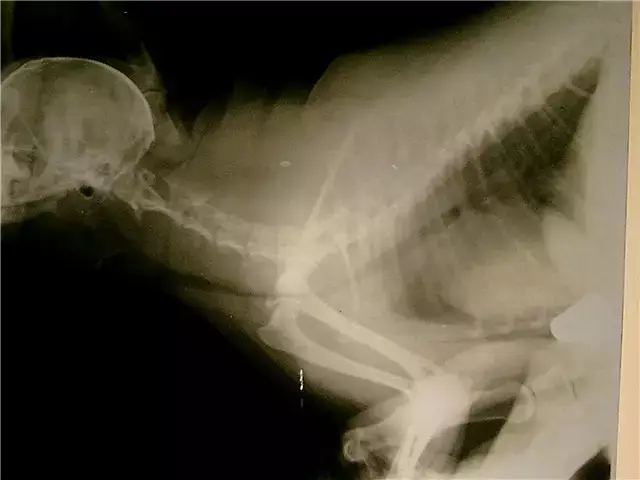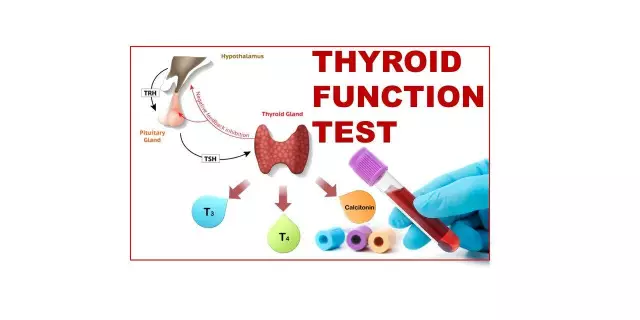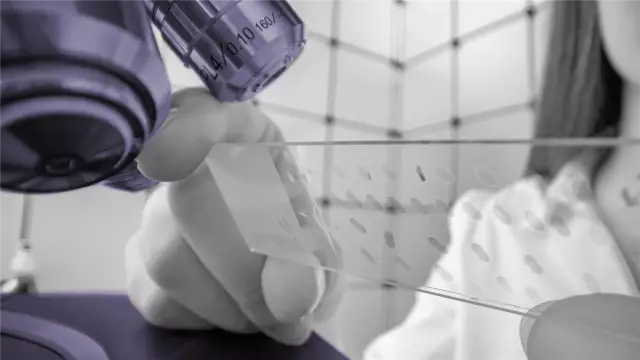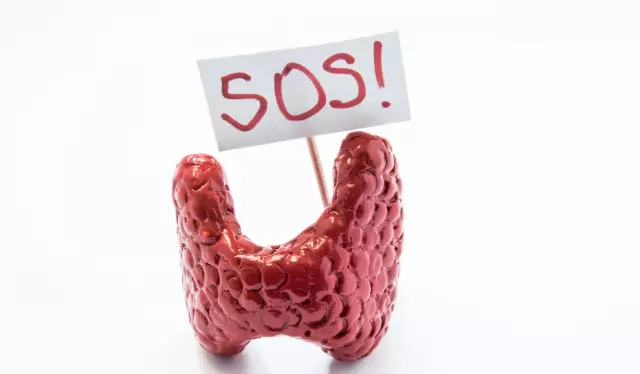- Author Rachel Wainwright wainwright@abchealthonline.com.
- Public 2023-12-15 07:39.
- Last modified 2025-11-02 20:14.
Thyroid
Instructions for use:
- 1. Release form and composition
- 2. Indications for use
- 3. Contraindications
- 4. Method of application and dosage
- 5. Side effects
- 6. Special instructions
- 7. Drug interactions
- 8. Analogs
- 9. Terms and conditions of storage
- 10. Terms of dispensing from pharmacies

Thyroid is a drug that compensates for the deficiency of thyroid hormones. Increases the tissue oxygen demand, stimulating their differentiation and cell growth, accelerates the metabolism of proteins, fats and carbohydrates. Improves the functioning of the nervous system, cardiovascular system, hepatic and renal function.
Release form and composition
Dosage form - tablets: white, round, flat-cylindrical, the edge is beveled, on one side there is a dividing line (60 pcs. In glass bottles, in a cardboard box 1 bottle; 50 pcs. In blisters, in a cardboard box 1 or 2 blister).
1 tablet contains:
- active ingredients: levothyroxine - 0.04 mg, liothyronine - 0.01 mg;
- auxiliary ingredients: gelatin, corn starch, lactose monohydrate, magnesium stearate, colloidal silicon dioxide, glycerin (glycerol) 85%.
Indications for use
- hypothyroidism (long-term persistent lack of thyroid hormones);
- euthyroid goiter;
- postoperative period after resection of the thyroid gland (replacement therapy and prevention of goiter recurrence);
- malignant tumor (cancer) of the thyroid gland (postoperative treatment);
- diffuse toxic goiter (as part of a complex treatment for fixing the euthyroid state after reaching it with the help of thyreostatics).
Contraindications
Absolute:
- acute myocarditis;
- angina pectoris of the III-IV functional class;
- acute myocardial infarction;
- untreated thyrotoxicosis;
- untreated adrenal insufficiency;
- individual hypersensitivity to active and auxiliary components.
Relative contraindications (Thyrotome is taken with caution): diseases of the cardiovascular system (ischemic heart disease, expressed by atherosclerosis, angina pectoris I - II functional class, a history of myocardial infarction, as well as arterial hypertension, tachyarrhythmia, heart failure, tachycardia, diabetes mellitus), severe long-term hypothyroidism, malabsorption syndrome (dose adjustment may be required), advanced age.
During pregnancy, hormonal therapy prescribed for the treatment of hypothyroidism must be continued with an increase in dose due to an increase in the level of thyroxine-binding globulin.
Despite the insignificant (even with high-dose therapy) amount of thyroid hormones that penetrate into breast milk during lactation, Thyrotome is taken with caution during breastfeeding, strictly observing the recommended dosage, and under the supervision of a doctor.
Method of administration and dosage
Thyroid is taken orally once a day, in the morning, not less than half an hour before breakfast. The tablets are not chewed and washed down with a sufficient amount of liquid. It is required to take the drug regularly.
The daily dose of the drug, depending on the indications:
- hypothyroidism (adult patients): the initial dose is 1 tablet, the dose may be increased by 1 tablet every 14-28 days until a maintenance dose of 2-5 tablets is reached;
- hypothyroidism (kids): Recommended average maintenance dose - 2-2 1 / 2 tablets at a dose selection to allow for long-term therapy height, weight and BSA (body surface area) of the child;
- euthyroid goiter (adult patients): initial dose - 1-2 tablets, maintenance dose - 3-6 tablets;
- euthyroid goiter (teenagers): initial dose of 1.1 1 / 2 tablets per day maintenance dose - 2 1 / 2 -3 1 / 2 tablets per day;
- euthyroid goiter (children): 1 / 2 -1 tablet;
- prevention of recurrence of goiter after resection of the thyroid gland (adult patients): 2-3 tablets;
- postoperative period after resection of a malignant tumor of the thyroid gland: initial dose - 3 tablets, maintenance dose - 6 tablets.
The duration of therapy is determined by the form of the disease. In hypothyroidism and after thyroidectomy for a malignant neoplasm of the thyroid gland, treatment is usually carried out throughout life. With euthyroid goiter and for the prevention of goiter recurrence in the postoperative period, the course ranges from several months or years to lifelong use.
Side effects
Subject to the recommendations on the dosage regimen and the constant monitoring of a specialist, side effects are usually not observed.
Perhaps the manifestation of hypersensitivity reactions, as well as the development of heart failure and angina pectoris.
In case of an overdose, symptoms that are characteristic of thyrotoxicosis are observed: palpitations, heart pains, heart rhythm disturbances, tremors, anxiety, sleep disturbances, hyperhidrosis, improved appetite, weight loss, diarrhea. Therapy of the condition is carried out depending on the severity of the above symptoms. At the discretion of the attending physician, it is possible to reduce the daily dose of Thyrotome, interrupt therapy for several days, or use β-blockers. After passing the side effects, the course is started with a lower dose, being careful.
special instructions
Before treatment of hypothyroidism caused by damage to the pituitary gland, laboratory tests should be carried out to identify insufficiency of the adrenal cortex. When this diagnosis is confirmed, glucocorticosteroid replacement therapy is started before the use of thyroid hormones for the treatment of hypothyroidism in order to avoid the development of acute adrenal insufficiency.
Thyroid does not affect the speed of psychomotor reactions and concentration of attention required to perform types of work associated with driving vehicles and complex mechanisms.
Drug interactions
- indirect anticoagulants: Thyrotome enhances their effect (it may be necessary to reduce their dose);
- tricyclic antidepressants: Thyrotome may enhance their effect;
- cardiac glycosides: the drug reduces their effect;
- insulin and hypoglycemic drugs for oral administration: thyroid hormones may increase the need for them (it is recommended to monitor blood glucose levels more often during therapy, it is imperative to determine the sugar content at the beginning of treatment and when changing the dosage regimen of Thyrotome);
- colestipol, colestyramine, aluminum hydroxide: inhibit the absorption of the drug in the intestine, reducing its plasma concentration;
- anabolic steroids, asparaginase, tamoxifen: at the level of protein binding, pharmacokinetic interaction is likely;
- phenytoin, salicylates, clofibrate, furosemide in high doses (up to 250 mg): the content of thyroid hormones, which are not associated with blood plasma proteins, increases;
- estrogen-containing drugs: increase the content of thyroxine-binding globulin, as a result of which the need for a Thyrotome may increase in some patients;
- somatotropin: when used simultaneously with thyroid hormones, it can accelerate the closure of the epiphyseal growth zones;
- phenobarbital, carbamazepine and rifampicin: may increase the clearance of levothyroxine, which requires an increase in the thyrotome dose.
Analogs
An analogue of Thyrotome is Novotiral.
Terms and conditions of storage
Store at 15-25 ° C. Keep out of the reach of children.
The shelf life is 3 years.
Terms of dispensing from pharmacies
Dispensed by prescription.
Information about the drug is generalized, provided for informational purposes only and does not replace the official instructions. Self-medication is hazardous to health!






